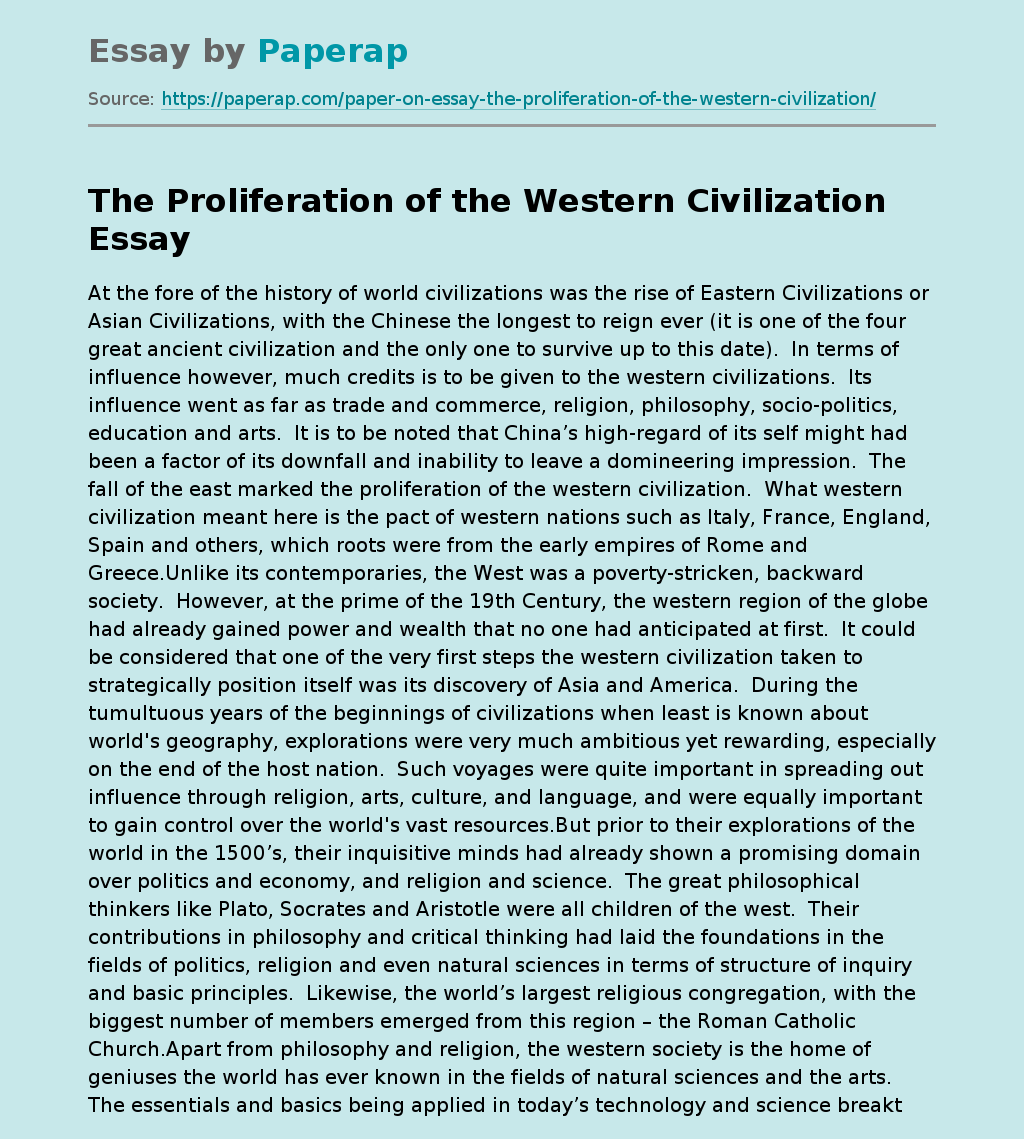The Proliferation of the Western Civilization
At the fore of the history of world civilizations was the rise of Eastern Civilizations or Asian Civilizations, with the Chinese the longest to reign ever (it is one of the four great ancient civilization and the only one to survive up to this date). In terms of influence however, much credits is to be given to the western civilizations. Its influence went as far as trade and commerce, religion, philosophy, socio-politics, education and arts. It is to be noted that China’s high-regard of its self might had been a factor of its downfall and inability to leave a domineering impression.
The fall of the east marked the proliferation of the western civilization. What western civilization meant here is the pact of western nations such as Italy, France, England, Spain and others, which roots were from the early empires of Rome and Greece.Unlike its contemporaries, the West was a poverty-stricken, backward society. However, at the prime of the 19th Century, the western region of the globe had already gained power and wealth that no one had anticipated at first.
It could be considered that one of the very first steps the western civilization taken to strategically position itself was its discovery of Asia and America. During the tumultuous years of the beginnings of civilizations when least is known about world’s geography, explorations were very much ambitious yet rewarding, especially on the end of the host nation. Such voyages were quite important in spreading out influence through religion, arts, culture, and language, and were equally important to gain control over the world’s vast resources.
But prior to their explorations of the world in the 1500’s, their inquisitive minds had already shown a promising domain over politics and economy, and religion and science. The great philosophical thinkers like Plato, Socrates and Aristotle were all children of the west. Their contributions in philosophy and critical thinking had laid the foundations in the fields of politics, religion and even natural sciences in terms of structure of inquiry and basic principles. Likewise, the world’s largest religious congregation, with the biggest number of members emerged from this region – the Roman Catholic Church.Apart from philosophy and religion, the western society is the home of geniuses the world has ever known in the fields of natural sciences and the arts. The essentials and basics being applied in today’s technology and science breakthroughs could all be traced back prior and at the dawn of industrial revolution. As according to Joel Mokyr’s words in his review of David Lande’s The Wealth and Poverty of Nations: Why Some Are So Rich and Some So Poor (1998), it was the western civilization that made the Industrial Revolution possible, an event that marked the proliferation of technological advancement. This has also contributed a lot to the boosting of the west’s economy, which in return helped them gain political advantage over other societies. Prior to the west’s economic success, the eastern civilization (Chinese in particular) had already discovered a lot of inventions and techniques that could have made them leave the west far behind. Nonetheless, with the westerns’ greed for knowledge and with great effort, they had been able to come up with inventions and techniques using the mechanisms used by other civilizations but with quality that were far better than the pioneers.As man shifted from hunting to farming and crop cultivation in securing supply of food, it would not be impossible for these cultures to settle on offshore topographies or from where access to water would be easy. In the case of the Chinese civilization, the first inhabitants settled by the Yellow river or the Huang Ho River while the first Native Americans like Olmecs, which settled by the Gulf Coast region of southern Mexico and the Mayas, which as located at the heart of Yucatan Peninsula, Pacific Ocean and Mexico’s Gulf Coast. In comparison to other societies or civilizations such as the Chinese civilization and Native American civilizations, western civilizations’ humble beginnings were built near the coasts, as for instance the Roman Empire, which is surrounded by seas on its three sides with Tyrrhenian Sea on the west side and Adriatic on the east. In fact, Rome is a region of Italy that is located near the Tiber River. The emergence of civilizations near the bodies of water and river valleys was mainly due to the needs for irrigation of their croplands. Eventually, access to bodies of water made way for trade with other civilizations.Apart from early settlements, other significant aspects of the proliferation of the early civilizations are their contribution to language and the arts. Since the time of the first man to set foot on earth until today, men have never ceased to develop better means of communication; it is with this that the influences of the early civilizations perpetuated even until today. During the thriving of the first settlers, communication had been made possible through drawings, which in time became the system of writing. While each civilization had been able to establish its own system of writing, the western’s contribution survived even up to this date.Other major aspects of the western civilizations that were comparable to other civilizations that flourished on other sides of the globe include architecture, beliefs to a higher deity, rigid societal hierarchy and others, which were already mentioned in the foregoing.Works CitedMokyr, Joel. Eurocentricity Triumphant. The American Historical Review. 02 May 2008 <
The Proliferation of the Western Civilization. (2019, Jun 20). Retrieved from https://paperap.com/paper-on-essay-the-proliferation-of-the-western-civilization/

